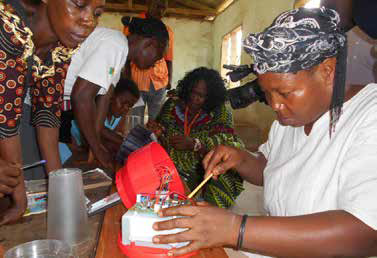
Description of the project: This South-South cooperation between grassroots communities of India and Cameroon builds women’s capacities as solar engineers that provide energy solutions adapted to local needs around agriculture, household electrification and education. Thanks to the Barefoot College in India, 20 women in the Fako district of Cameroon have been trained to install solar panels, lamps, dryers and mills, benefiting 400 families. As educators and engineers of sustainable solutions, rural women are effectively empowered in their community and within a worldwide pioneering movement.
Climate impact: Replacing fossil fuel and firewood with decentralized solar energy in rural households and villages bears an immense potential for climate mitigation, income generation and social welfare in the global South. 250 kerosene lanterns, each emitting approximately 200kg of CO2/year, were replaced by solar lamps, reducing 50 t. CO2. Further solar energy solutions installed in 400 households saved another 80 t. CO2. Such local impact can be scaled up nationally.
Gender impact: This project tackles gender inequality in the rural South via solidarity-based intercultural exchange. Four grassroot “grandmas”, trained by the Barefoot College in India to become solar energy experts and agents of change, have trained 20 rural women in Cameroon to spread clean energy solutions in their communities. All have enhanced their right to access vocational education and equal opportunities; they have improved their social status and decision making power at the community level.
Scalability / replicability: Barefoot College is a long established grassroot movement that has disseminated an exemplary model of local appropriation and successful replication in over 70 countries. Building on this South-South cooperation, the Rural Women Development Center aims to scale-up this program by building a rural training center and doubling the number of beneficiaries.